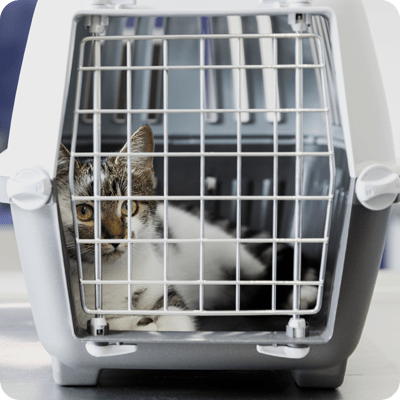Feral cats aren’t cuddly lap kitties – in fact they don’t really trust humans – but they still find their way into many people’s hearts. And even if we can’t touch or pet them, we can help feral cats live long and healthy lives in their outdoor homes.
One thing that gives our feral cats far-reaching health benefits is Trap-Neuter-Return (TNR). Just as for pet cats, spaying or neutering feral cats limits the chance of serious health problems such as mammary cancer in females or testicular cancer in males. And since feral cats live outside in groups or colonies, spay/neuter prevents males from fighting over mates, the stress of pregnancy and nursing in females, and the sad reality of unwanted kittens. In TNR, cats are also vaccinated against rabies, supporting both their health and the public health. Many TNR clinics will also treat for fleas, ticks, roundworms and ear mites while they’re in for surgery.


TNR also means providing food and water, warm and dry winter shelter, and ongoing healthcare. Good nutrition supports healthy immune systems, and wet food has distinct advantages over dry. It keeps kitties hydrated and it’s easier to digest, which really helps in winter when ferals have to burn more calories to stay warm. But if we can’t keep wet food from freezing, dry food comes in handy.
Other health concerns for feral cats include parasites and herpes infections. For healthy adults, these usually aren’t serious enough to need treatment. But changes in the colony’s environment, such as construction, can cause stress. And stress can make herpes infections flare up and cause weepy eyes or a runny nose, or make it hard for a cat to fight off fleas and other parasites. If it’s bad enough, the colony may need treatment.

It’s good to have a veterinarian who understands feral cats, so you can ask them whether the colony needs medication or a trip to the animal clinic.The vet may be able to recommend oral meds that you can mix in the cats’ food. For fleas, there’s nitenpyram (Capstar) and lufenuron (Program), and for internal parasites there’s Pyrantel (Strongid) and fenbendazole (Panacur). We try to avoid adding to a feral cat’s stress by retrapping him and taking him to the vet, but it’s the best thing to do if DIY remedies aren’t helping.
Health issues may not be avoidable, but prevention is great medicine. If your colony kitties are TNRed, well-fed and have warm and dry sleeping shelters, they’ll have less stressful, healthier lives.
For more information on feral cat care, visit www.nycferalcat.org.





